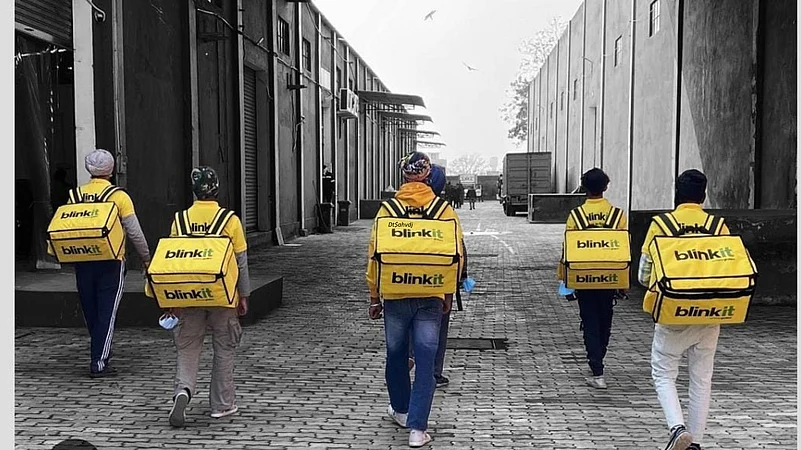Back in 2011, five relatively young Indian entrepreneurs emerged from the early retirement they had taken to enjoy what life has to offer after successfully launching their first company . They started roaming the streets of Bengaluru (then called Bangalore) buying fruits, vegetables and other groceries from local stores and delivering them to homes.
And thus was born BigBasket — India’s first (and for a long time only) foray into digital kirana shopping. What Hari Menon, VS Sudhakar, VS Ramesh, Vipul Parekh and Abhay Choudhary were betting on was India’s growing internet penetration.
The idea worked. BigBasket soon secured support from big investors including the likes of China’s Alibaba Group and South Korea’s Mirae Asset Global Development. The two investor groups combined pumped in around $150 million dollars into BigBasket.
In 2021, the Tata Group found BigBasket worthy of acquiring. They bought 64 per cent stake in the company. Cut to 2024, BigBasket, the effective pioneer of quick commerce in India, is towards the bottom of the list of major quick commerce players.
The top player now is Blinkit.
Born as Grofers in 2013 in Gurugram (then called Gurgaon), the company founded by Albinder Dhindsa and Saurabh Kumar had nothing going for it for years.
In 2021, the same year Tata acquired BigBasket, Grofers renamed itself Blinkit. A year later, Zomato, by now a food delivery giant, acquired the platform. What came next was a wave of successes. With a huge volley of dark stores in its armoury, Blinkit emerged as the market leader in the quick commerce space.
As of December 2023, Blinkit has claimed 46 per cent of the market share, according to a report by investment bank JM Financial. Two other major players in the mix are Instamart by Swiggy with a 27 per cent market share and Zepto with a 21 per cent market share. The storied BigBasket has just about 6 per cent.
The lesson in all of this: Tides turn quickly in the quick commerce market.
The Secret to Success
There is really none. Success in quick commerce is fairly straightforward — it depends on the number of dark stores a company has and where they are located. “The formula to succeed is to have dark stores at strategic locations,” says Arvind Singhal, founder and chairman of Technopak Advisors, a Gurugram-headquartered management consulting firm.
The building of dark store networks has been at the core of the success of quick commerce players. These dark stores are like modern-day retail supermarkets just that customers are not allowed to walk in.
“The main challenge for quick commerce was figuring out a viable unit-level economics. Optimised dark stores and scaling up demand have helped improve unit-level economics over time,” says Anand Ramanathan partner and leader, consumer products and retail sector at Deloitte India.
Over time, dark stores have evolved to accommodate more stock-keeping units (SKUs), providing consumers better choices.
While providing consumers choice and scalability is important, consumers must pay for the service, says Akshay D’souza, chief of growth and insights at Bizom, a retail intelligence platform. D’souza says burning cash cannot be a viable model in the quick commerce business, something experts currently see a lot of quick commerce platforms doing.
Wait and Watch
A number of players walked into the quick commerce field over the last few years, only to retreat quickly. Take for example Jio Mart Express, Reliance’s q-commerce foray, and Ola Dash.
On the other hand, tech giants such as Amazon and Walmart-owned Flipkart are watching this rise of quick commerce keenly and with caution. These ecommerce giants have the wherewithal, and can quickly mount a challenge if they so will.
Multiple experts that Outlook Business spoke to said these players are capable of disrupting the oligopoly in quick commerce and it is not too late to grab a share of the pie. Businesses that have physical presence, like Amazon and Flipkart, are better positioned to make a mark in the quick commerce space by outsourcing last-mile delivery and widening assortment of products with more SKUs, says Ramanathan of Deloitte India.
Conglomerates like Amazon, Reliance and Tata have decades of experience in the retail sector and can soon catch-up with the emerging giants of quick commerce. “You cannot count out Amazon, Tata and Reliance,” says Singhal. Their intensity will grow over time, he adds.
Singhal says there are multiple vulnerabilities in the incumbent champions of quick commerce. He cites the example of Zepto. He says Zepto lost its unique selling point (USP) as others joined the 15-minute delivery club.
“It (Zepto) has no other stickiness and not much capital scalability at its disposal. Somebody like Amazon Fresh can also bring down its delivery time if it wishes and grab a market share with its good user interface,” Singhal adds.
Amazon Fresh has not entered the quick commerce segment yet. It delivers products in a two-hour window. Some observers say the tech giant can take a different route to make some headway in the highly competitive quick commerce segment.
“In India, Amazon seems to have abandoned quick commerce for now as it probably does not make sense for them to target a 10–15 per cent market of the already small grocery business. That is why they have moved their campaign to planned purchases. I feel it will be more difficult for them to change an obvious consumer trend with heavy ad spends. I do expect though that once they see a successful player emerging, they will try to acquire [it],” says Santosh Sreedhar, partner at Avalon Consulting.
And Amazon and Flipkart are not the only players eyeing this space. Sreedhar says the next level of transformation in the quick commerce space will be tapped by tech giants such as Google and Meta when they enable the convergence of social commerce and quick commerce. He says he expects these tech giants to leverage their social networking and messaging platforms such as YouTube, WhatsApp, Instagram and Facebook.
There is an intense race going in the quick commerce space, and Blinkit, right now, is leading. But the race is far from over—and upsets are still possible.































